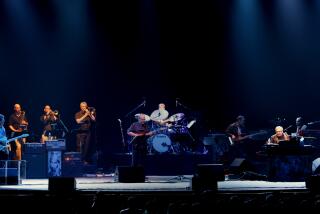Jerome Charles (J.C.) Heard, 71; Jazz Drummer and Bandleader
Jerome Charles (J.C.) Heard, a drummer and leader who found acceptance in foreign lands at a time when American audiences were turning their back on the Big Band beat of the 1930s and ‘40s, has died in a Michigan hospital.
A spokeswoman for Beaumont Hospital in Royal Oak said Wednesday that Heard had died there Tuesday night. She would not provide a cause of death, but United Press International quoted Earl Van Riper, a friend and fellow jazz musician from Detroit, as saying Heard had suffered a heart attack.
Heard, who worked with such legendary jazz figures as Duke Ellington, Count Basie, Dizzy Gillespie and Cab Calloway, as well as fronting both big bands and small groups, was 71.
Heard and his band, based in Detroit, had performed Friday night in Grand Rapids and were scheduled to perform tonight at the Detroit Institute of Arts along with Gillespie, Doc Cheatam and the New McKinney Cotton Pickers.
At the time of his death, he was living in Troy, a Detroit suburb.
Born in Dayton, Ohio, Heard comfortably crossed over during the swing and jazz eras, first with Teddy Wilson’s big band in 1939-40 and later with Benny Carter, Calloway and others before he formed his own sextet in 1946.
But over the years he had become disillusioned with America’s response to his music.
“Jazz music today is nothing like it should be,” he said in one recent interview. “In fact it is at the bottom of the list as far as music is concerned throughout the country. . . .”
Heard compensated for the lack of interest by spending several years in Japan, a country he had first visited in 1953 as a member of Norman Granz’s Jazz at the Philharmonic’s group. In that band were trumpeter Roy Eldridge, saxophonist Ben Webster, pianist Oscar Peterson and vocalist Ella Fitzgerald.
He stayed on after that early tour because of the warm welcome he had received and “the local promoter told me he would pay me double what Granz did. . . .” He spent four years in Japan, China, the Philippines and Australia, returning to find the musical times still lean.
He formed a sextet that played Cafe Society in Greenwich Village and a quartet that worked Los Angeles, Las Vegas, Dallas, New Orleans and Detroit, where he settled permanently in 1966.
Many jazz experts believe Heard’s influence on the be-bop era was underrated.
“I played with Dizzy on some of his first stuff,” Heard said in a recent interview with the Detroit News. “I met Charlie Parker while playing with Cab in Kansas City. So did Dizzy.”
He has been likened in talent with drummers Jo Jones and Cozy Cole and had recorded with Red Norvo, Parker and Gillespie.
Tonight at the Detroit Arts Institute, Heard had been scheduled to take over the second half of the show, first playing the music of Ellington and Basie, then backing Gillespie.
More to Read
The biggest entertainment stories
Get our big stories about Hollywood, film, television, music, arts, culture and more right in your inbox as soon as they publish.
You may occasionally receive promotional content from the Los Angeles Times.










